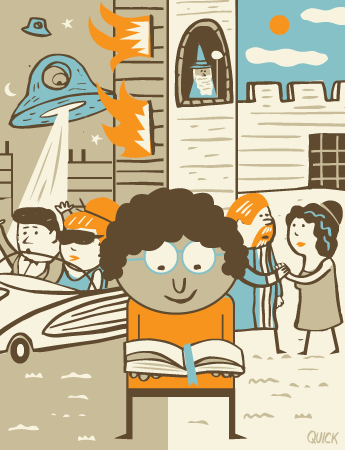A writer friend recently said to me, “I only read literary fiction. I can’t stomach the other stuff.” By “other stuff,” he was referring to what he considers to be lesser novels – namely, thrillers and science fiction. However, there is plenty of evidence that novels in any genre can be literary: Ursula Le Guin’s books might be classified as fantasy or science fiction, Graham Greene brilliantly explored the world of spies, and Karl Ove Knausgård writes what would certainly be deemed “domestic fiction” or “women’s fiction” if the author happened to be a woman. Yet, all of these authors share one thing in common: strong literary chops. So, too, with Kate Atkinson, whose books are commercially successful, deeply suspenseful, and beautifully written.
Spacemen and spies are not the enemy of good literature.

“Novels in any genre can be literary if the writer pays close attention to craft.” (Illustration by Josh Quick)
Novels in any genre can be literary if the writer pays close attention to craft. Just because a novel has a strong plot or a spaceship or a spy doesn’t mean it isn’t literary. The publishing industry has in many ways come to terms with this reality, but a lot of writers haven’t. And I get it, I do.
Without using the convenient labels, how do we describe, in two sentences or fewer, what we write? Conversation demands that we categorize our writing in a couple of sentences. I can’t tell you how many times I’ve been asked, on the playground or at a party, “What kind of novels do you write?”
I welcome the question and appreciate the interest, but I also know that if I try to explain the gist of my books or the nuances of my style, I’ll sound like a bore. Any author knows that those who express an interest in your writing are either A) interested in your writing or B) making small talk until someone better comes along. The odds skew pretty heavily toward B.
There is a difference between bad writing and good writing.
Many novels clearly lack certain qualities that we have come to associate with literary fiction. No one would accuse Fifty Shades of Gray of being literary, but that has little to do with subject matter. The reason Fifty Shadesisn’t literary is that the writing is sloppy and the characters are thin. Nicholson Baker’s Vox, which is far more erotic than Fifty Shades, is often considered literary; this is largely a matter of style, not subject. Lydia Netzer’s Shine Shine Shine is about a man lost in outer space, and Michael Faber’s The Book of Strange New Things follows a missionary to a distant planet, where he has been sent to convert the natives. However, both of these novels, while existing in the realm of science fiction, are also “serious” literary works.
You have to call it something.
I must confess, however, that I sometimes use the term “literary mainstream fiction” when asked to classify my own work. This is largely a reaction to having my books classified as “women’s fiction” for no other reason than the fact that I am a woman. I say “mainstream” because I’ve been fortunate in that my novels have found a mainstream audience, but also because saying “I write literary fiction” sounds a bit snooty. As if I’m thumbing my nose at writers whose books don’t contain the word “literary” in the metadata. I care very much about the complexity of the characters and the sound of every sentence, whether I’m writing about a missing child, a dead mathematician, or California seceding from the union.
My stories are deemed “literary” by virtue of being published by small literary presses, and, more importantly perhaps, by having an extremely limited readership. In fact, when a friend purchased my latest story collection, “Hum,” at a local bookstore recently, the bookseller said, “Michelle Richmond seems to write for two different audiences.”
As much as I love that bookstore, I found the comment peculiar. Both my novels and my stories are tremendously influenced by place. The sentences in my short stories share a rhythm and style with the sentences in my novels. In terms of character development, my novels might actually be considered more “literary” than my stories.
It’s all about the marketing.
In reality, the primary difference between my novels and my stories is marketing. The cover copy of my novels tends to emphasize words like “relationship,” “sisters,” and “family drama” – catchphrases of women’s fiction that, I’ve been told, sell books. (Cover copy, like metadata, is usually written by the marketing department, not the author.) Someone who has read the cover copy for my story collections and my novels might logically conclude that I have two different audiences in mind when I’m writing. This isn’t the case. It’s merely a matter of packaging.
Which brings me back to what is becoming an increasingly irrelevant term, “literary fiction.” Often, books that are marketed as literary are no more literary than their counterparts in other genres. A publisher, largely driven by the marketing department, has made the decision to call the book literary, and it has very little to do with what is actually written between the covers of the book. While labels can help readers find books, they shouldn’t be the only consideration we take into account when we select our next book.
What you might be missing
I think of the writer who said, “I can’t stomach the other stuff,” and I think of all the great books he’s missing, because he’s convinced that they are not quite literary enough, that they are lesser works of art.
My advice to readers? Be open to any genre. You just might find that the next great literary novel you pick up is filled with spacemen, spies, or diapers and prams. I’d give the same advice to writers, with a twist: be open to the possibilities of other, “lesser” genres when you write. Don’t be precious (and please: don’t be pretentious) about your work. Let the story, not the label, guide you.

Michelle Richmond is the New York Times bestselling author of the novels Golden State, The Year of Fog, No One You Know, and Dream of the Blue Room, and the award-winning story collections Hum and The Girl in the Fall-Away Dress. Her stories and essays have appeared in Glimmer Train, Playboy, The Missouri Review, The Kenyon Review, The Believer, and elsewhere. She has received the Associated Writing Programs Award for Short Fiction, The Mississippi Review Fiction Prize, the Catherine Doctorow Innovative Fiction Prize, and the Hillsdale Award for Fiction from the Fellowship for Southern Writers. She is the founder and publisher of Fiction Attic Press. She lives in Northern California.